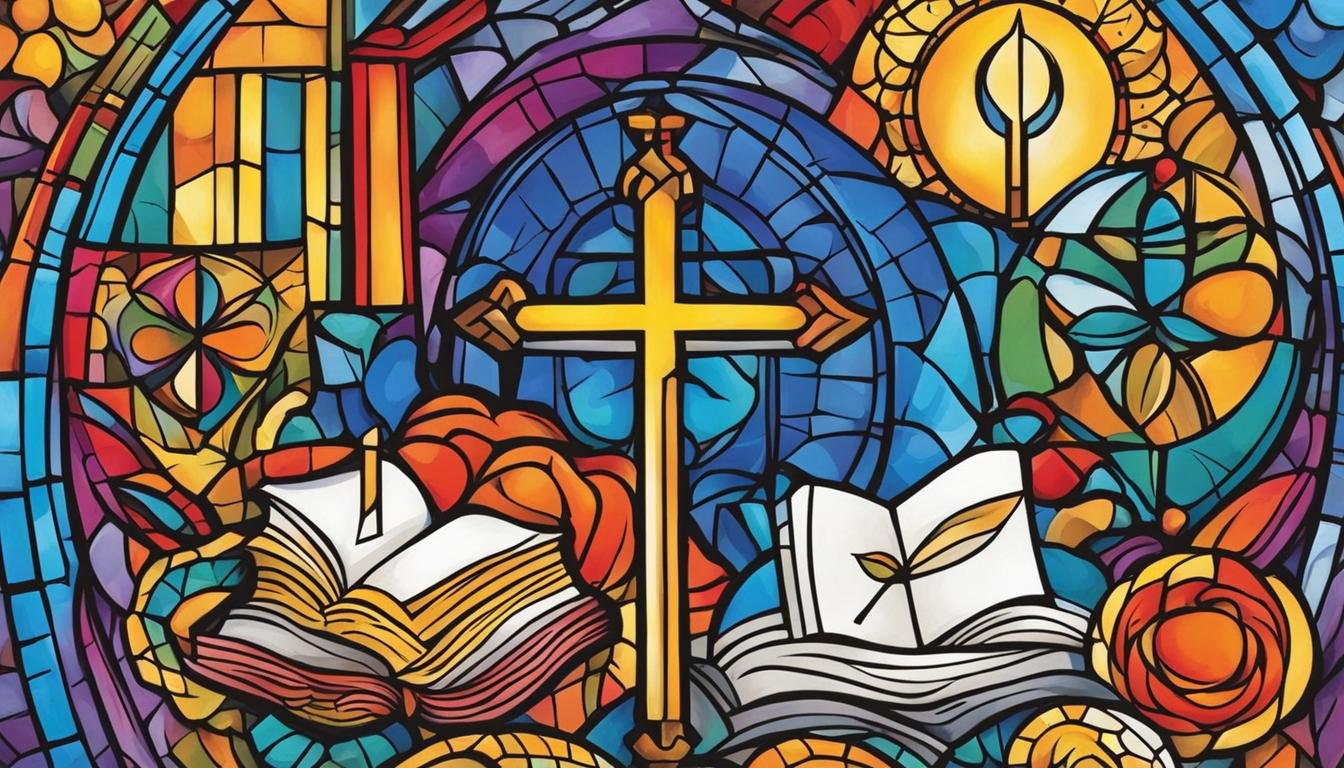According to Catholic belief, there are seven sacraments in the Bible. These sacraments are baptism, confirmation, the Eucharist, confession, anointing of the sick, holy orders, and marriage. They are considered material signs that bring about sanctification and healing, and they have their roots in the words and actions of Jesus Christ. Each sacrament serves a specific purpose and plays a significant role in the spiritual life of Catholics.
Key Takeaways:
- The Bible recognizes seven sacraments in Catholic belief.
- The sacraments are baptism, confirmation, the Eucharist, confession, anointing of the sick, holy orders, and marriage.
- Each sacrament has its origins in the words and actions of Jesus Christ.
- The sacraments play a vital role in the spiritual life of Catholics.
- They are considered material signs of grace and instruments of God’s love and mercy.
The Biblical Origins of the Seven Sacraments
The sacraments in the Bible find their origins in the teachings and actions of Jesus Christ as recorded in the Gospels. Each sacrament has a deep biblical basis that reflects the mission of Christ and his desire to bring salvation and grace to his followers.
One of the most fundamental sacraments, baptism, traces its roots back to Jesus’ own baptism in the Jordan River. In Matthew 28:19, Jesus instructs his disciples to baptize others, emphasizing the importance of this sacrament in the life of a believer. Confirmation, on the other hand, can be found in the accounts of the Holy Spirit descending upon Jesus and his followers after his resurrection, as described in Acts 2:1-4.
“And they were all filled with the Holy Spirit…” – Acts 2:4
The Eucharist, often referred to as the “source and summit” of the Catholic faith, was instituted by Jesus at the Last Supper. In Luke 22:19-20, Jesus breaks the bread and shares the cup with his disciples, instructing them to “do this in remembrance of me.” This profound moment serves as the foundation for the sacrament of the Eucharist.
Other sacraments, such as confession, anointing of the sick, holy orders, and marriage, can also be traced back to their biblical origins. Confession can be seen in Jesus’ ministry of forgiving sins, as recorded in John 20:23, where he tells his disciples, “If you forgive the sins of any, they are forgiven them.” The anointing of the sick is rooted in the Letter of James, which encourages the elders to pray and anoint the sick with oil (James 5:14-15). Holy orders can be found in Jesus’ appointment of the apostles to carry on his mission (Matthew 10:1-4), and the sacrament of marriage is based on the creation of man and woman in God’s image and likeness (Genesis 1:27).
By understanding the biblical basis of the sacraments, Catholics gain a deeper appreciation for their significance and role in their spiritual lives. These sacraments are not mere rituals but tangible encounters with the saving presence of Christ, providing grace, healing, and unity to believers.
The Biblical Origins of the Seven Sacraments
In summary, the seven sacraments in the Bible have their roots in the teachings and actions of Jesus Christ as recorded in the Gospels. Baptism, confirmation, the Eucharist, confession, anointing of the sick, holy orders, and marriage all find their origins in Scripture. These sacraments have a deep biblical basis that reflects the mission of Christ and his desire to bring salvation and grace to his followers.

| Sacrament | Biblical Basis |
|---|---|
| Baptism | Jesus’ baptism in the Jordan River and his command to baptize others (Matthew 28:19) |
| Confirmation | The outpouring of the Holy Spirit on Jesus and his followers after his resurrection (Acts 2:1-4) |
| The Eucharist | Institution by Jesus at the Last Supper (Luke 22:19-20) |
| Confession | Jesus’ ministry of forgiving sins and empowering his disciples to do the same (John 20:23) |
| Anointing of the Sick | The encouragement to pray and anoint the sick with oil in the Letter of James (James 5:14-15) |
| Holy Orders | Jesus’ appointment of the apostles to carry on his mission (Matthew 10:1-4) |
| Marriage | The creation of man and woman in God’s image and likeness (Genesis 1:27) |
The Role and Purpose of Each Sacrament
The sacraments in Catholicism serve distinct purposes and play essential roles in the spiritual life of believers. Each sacrament is a visible sign of God’s grace and is believed to bring forth sanctification and healing. Below is an overview of the significance and purpose of each sacrament:
Baptism
The sacrament of baptism is the first step in the journey of faith. It cleanses individuals of original sin and initiates them into the body of Christ, the Church. Through baptism, Catholics believe they are reborn as children of God and become part of the Christian community.
Confirmation
Confirmation completes the grace of baptism and strengthens individuals with the gifts of the Holy Spirit. It is seen as a personal affirmation of one’s faith and commitment to live as a fully initiated member of the Church. Through the sacrament of confirmation, Catholics receive the strength and courage to bear witness to their faith and actively participate in the mission of the Church.
The Eucharist
The Eucharist, often referred to as Holy Communion, is the central sacrament of Catholicism. It is the reception of the body and blood of Jesus Christ. By partaking in the Eucharist, Catholics believe that they enter into a profound union with Christ and receive spiritual nourishment for their journey of faith. It is a celebration of the Paschal Mystery – the life, death, and resurrection of Jesus.
Confession
The sacrament of confession, also known as reconciliation or penance, provides Catholics with the opportunity to seek forgiveness for their sins and experience reconciliation with God and the Church. Through confession, individuals confess their sins to a priest, receive absolution, and are guided towards spiritual growth and healing.
Anointing of the Sick
The sacrament of the anointing of the sick is administered to those who are facing serious illness, physical decline, or the approach of death. It provides comfort, strength, and healing to individuals in their time of need. Through the anointing of the sick, Catholics believe that God’s grace is bestowed upon the person for spiritual and physical well-being.
Holy Orders
Holy orders is the sacrament through which men are ordained as bishops, priests, or deacons. It is a calling to serve the Church and carry out the ministerial priesthood. Through ordination, individuals are consecrated and empowered to preach, teach, and administer the sacraments, embodying the presence of Christ in the world.
Marriage
The sacrament of marriage is a sacred union between a man and a woman, a lifelong commitment that reflects the love and unity of Christ for His Church. Through marriage, couples receive graces and blessings, enabling them to live out their vocation as spouses and parents and create a loving and nurturing environment for their family.
Each sacrament holds deep significance and contributes to the spiritual growth and journey of Catholics. They provide avenues for individuals to encounter God’s grace, experience healing, and draw closer to the divine presence in their lives.
Conclusion
The sacraments in the Bible hold great significance for Catholics, as they are seen as material signs of grace and instruments of God’s love and mercy. They have their roots in Scripture and are supported by various passages that highlight their purpose and importance.
Through the sacraments, Catholics believe they encounter the saving and sanctifying presence of Christ in their lives. Whether it is the forgiveness of sins, the reception of the Eucharist, or the sacrament of marriage, each sacrament plays a vital role in the spiritual journey of a believer.
Understanding and participating in the sacraments are essential for Catholics to grow in their faith and experience God’s grace.
FAQ
How many sacraments are there in the Bible?
According to Catholic belief, there are seven sacraments in the Bible. They are baptism, confirmation, the Eucharist, confession, anointing of the sick, holy orders, and marriage.
What are the biblical origins of the seven sacraments?
The sacrament of baptism is rooted in Jesus’ own baptism in the Jordan River and his command to the apostles to baptize others. The sacrament of confirmation finds its basis in the outpouring of the Holy Spirit on Jesus and his followers after his resurrection. The Eucharist, considered the body and blood of Christ, was instituted by Jesus at the Last Supper. The sacrament of confession or reconciliation is tied to Jesus’ ministry of forgiving sins and empowering his disciples to do the same. The anointing of the sick can be traced back to the Letter of James, which speaks of calling the elders to pray and anoint the sick with oil. Holy orders stem from Jesus’ appointment of the apostles to continue his ministry, and marriage is rooted in the creation of man and woman in the image and likeness of God.
What is the role and purpose of each sacrament?
Each sacrament serves a specific purpose in the spiritual life of Catholics. Baptism cleanses an individual of original and personal sin and initiates them into the body of Christ. Confirmation completes the grace of baptism and strengthens the individual with the gifts of the Holy Spirit. The Eucharist is the reception of the actual body and blood of Christ and serves as a source of nourishment and unity for believers. Confession allows individuals to seek forgiveness for their sins and experience reconciliation with God and the Church. The anointing of the sick provides comfort and healing to those facing illness or old age. Holy orders ordains men to carry out the ministerial priesthood, and marriage bestows graces upon couples and establishes a sacred union before God.
What is the significance of the sacraments in Catholicism?
The sacraments in the Bible hold great significance for Catholics, as they are seen as material signs of grace and instruments of God’s love and mercy. Through the sacraments, Catholics believe they encounter the saving and sanctifying presence of Christ in their lives. Whether it is the forgiveness of sins, the reception of the Eucharist, or the sacrament of marriage, each sacrament plays a vital role in the spiritual journey of a believer. Understanding and participating in the sacraments are essential for Catholics to grow in their faith and experience God’s grace.

I’m Benjamin, a passionate spiritual seeker and creator of Verses and Prayers. Alongside my girlfriend Emma and our pet lizard Mulle, I cherish family life, enjoy exploring new places, and am deeply involved in my church community. My love for reading and singing biblical verses inspires every aspect of my journey.

